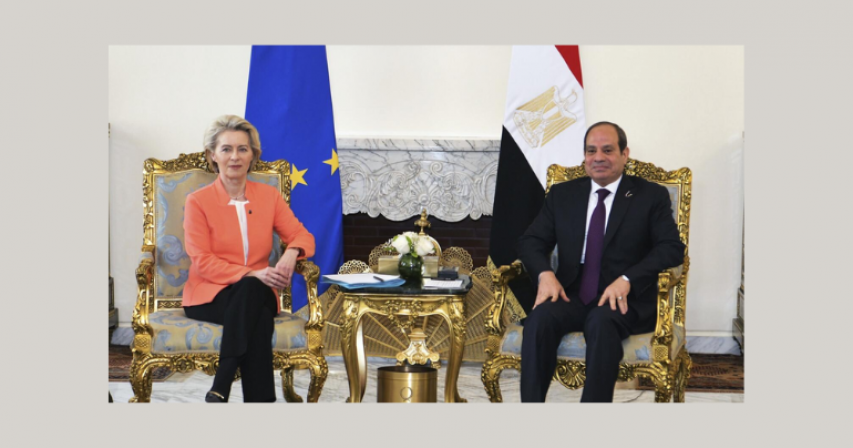EU announces $8 billion aid package for Egypt as concerns mount over migration

The European Union has pledged a substantial aid package of 7.4 billion euros ($8 billion) for Egypt, aiming to alleviate economic strain and address concerns regarding potential migrant influxes to European shores. The agreement, though criticized by rights groups, was signed in Cairo in the presence of Egyptian President Abdel Fattah El Sisi and European Commission President Ursula von der Leyen, along with leaders from Belgium, Italy, Austria, Cyprus, and Greece.
This aid package, spanning over the next three years, comprises grants and loans, with a significant portion allocated as macro-financial assistance amounting to 5 billion euros ($5.4 billion). The EU and Egypt aim to elevate their cooperation to a strategic and comprehensive partnership, expanding collaboration across economic and non-economic domains.
The Joint Declaration emphasizes promoting democracy, fundamental freedoms, human rights, and gender equality. Additionally, both parties commit to tackling challenges related to migration and terrorism. The EU will extend support to Egypt in fortifying its borders, particularly with Libya, to address the migration crisis. Furthermore, assistance will be provided to host Sudanese refugees fleeing conflict in their country.
Amidst concerns about potential spillover from the Israel-Hamas conflict into Egypt's Sinai Peninsula, the aid aims to bolster Egypt's capacity to manage migratory pressures. Egypt currently hosts millions of migrants, including refugees and asylum-seekers, with many seeking refuge or transiting through the country en route to Europe.
This aid package is expected to provide a much-needed economic boost to Egypt, which has faced challenges from government austerity measures, the COVID-19 pandemic, fallout from the Russia-Ukraine conflict, and the recent Israel-Hamas conflict. Notably, Egypt recently reached a deal with the International Monetary Fund to increase a bailout loan to $8 billion, accompanied by economic reforms such as currency flotation and interest rate adjustments.
In summary, the EU's aid package signifies a commitment to supporting Egypt's economic stability and addressing migration-related challenges. Despite criticisms, the agreement underscores the importance of international cooperation in addressing complex regional issues.
By: Sahiba Suri





Comments